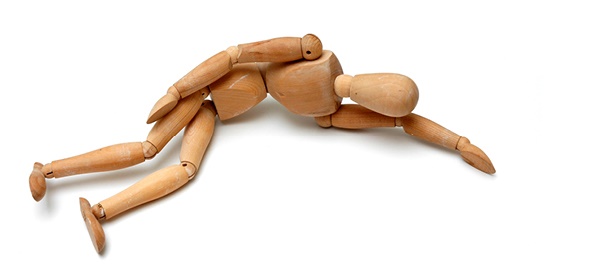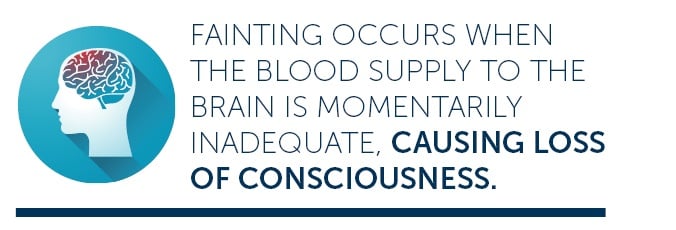
- Fainting happens when blood supply to the brain is momentarily insufficient, causing brief loss of consciousness.
- Fainting is usually not harmful, but it can have serious underlying causes and should always be taken seriously.
- Signs of fainting may include a pale pallor, sweating and lightheadedness.
- First aid involves getting the person to lie down, and restoring blood flow to the brain.
What causes fainting?
Fainting occurs when the blood supply to the brain is momentarily inadequate, causing loss of consciousness. This loss of
consciousness is usually brief; a few seconds to a few minutes.
Common triggers include standing for long periods, dehydration, the sight of blood, coughing, urination, having a bowel
movement and emotional distress. But in some cases, the cause can't be determined.
Fainting can have no medical significance, or the cause can be serious, such as a cardiac or neurological problem. Treat loss of consciousness as an emergency until the signs and symptoms are relieved and a serious underlying cause ruled out.
Signs and symptoms
Before a faint, there may be warning signs and symptoms, such as:
- Pale or flushed pallor.
- Feeling of warmth.
- Weakness.
- Lightheadedness.
- Nausea.
- Sweating.
- Rapid breathing (hyperventilation).
- Dimming of vision.
- Difficulty hearing or ringing in the ears.
These may precede either a near faint or total loss of consciousness.

First aid for fainting
If someone complains of feeling faint:
- Get him to lie down. (If they can't lie down then sitting down is the next choice.)
- Help restore blood flow by raising the person's legs above the level of the head (about 30cm).
If someone faints:
- Check the ABCs (Airway, Breathing, Circulation), and, if necessary, begin CPR and call an ambulance. Continue CPR
until help arrives or the person responds and begins to breathe. - If the person is breathing but unconscious, then put them in the recovery position.
- Loosen constrictive clothing. If the person doesn't regain consciousness within one minute, or if there are any serious
injuries, call for emergency medical assistance. Also call immediately if there are symptoms of stroke
(e.g. slurred speech or difficulty moving a limb) after fainting. - Stay with the person while they are recovering. They may feel tired or weak for several hours afterwards.
If you are prone to faints, when to see a doctor:
- If you have fainted more than once in a month.
- If you have a heart condition, diabetes or high blood pressure.
- If you are over 50.
- If there has been no warning signs prior to the faint.
- If you fainted when turning your head.
- If you are taking new medication.
- If you have chest pain, irregular heartbeat, shortness of breath or blurred vision before or after fainting.
- If you are pregnant.
- If you had any injuries from falling because of fainting.
- If it took longer than a few seconds to regain consciousness.
Prevention
It may be possible to prevent a fainting episode, even when you're already experiencing the telltale signs and symptoms.
If you think you're going to faint, find a safe place to lie down and, if possible, lift your legs up.
If you're prone to fainting:
- Talk to your doctor to help determine your specific triggers for fainting, and avoid them.
- Drink enough fluids and don't skip meals. Dehydration and not eating can lower blood pressure.
- Rise slowly from a lying or sitting position, to give your body time to adjust.




 Publications
Publications
 Partners
Partners











